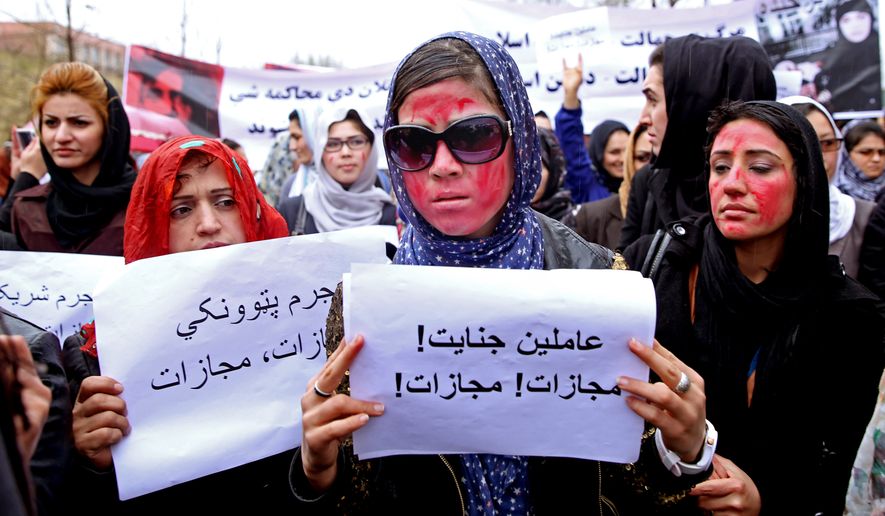Women remain embattled in Afghanistan some 15 years after the U.S. intervention there, according to a U.S. watchdog’s report released Sunday that says they have made strides in education and economic opportunity, but attitudes within the country are increasingly hostile.
Women still face violent resistance when they try to assert equal rights, not just from the Taliban and associated insurgents, but also from criminal gangs and even their own neighbors when they attempt to attend school or join the workplace, according to Congress’ Special Inspector General for Afghanistan Reconstruction.
The study shows backsliding on a number of other fronts: Insurgents control more ground and are increasingly making efforts to corrupt Army recruits, violent attacks are at a seven-year peak, and unemployment, poverty and opium production are all rising.
“Past gains are eroding,” Inspector General John F. Sopko said in his latest quarterly report to Congress.
Mr. Sopko has sounded repeated warnings about losing ground in Afghanistan, saying corruption in the government there undermines a significant amount of the money American taxpayers have shelled out to help the troubled country.
But this latest quarterly report takes a particular look at women in Afghan society and finds a complicated picture, based on in-depth interviews with more than 40 women, including Afghan first lady Rula Ghani, Cabinet ministers and members of parliament.
Women said they are better off than they were when the country was ruled by the Taliban but still face social hurdles and threats to their safety.
More than 22 percent of women are now contributing to their family’s finances, up from about 14 percent in 2009, but the percentage of Afghans who believe women should work outside the home has dropped from 71 percent to 64 percent.
Men often confiscate their female relatives’ pay.
One female member of the Afghan parliament who ran a nonprofit to help women market their handicrafts was shot for arguing with men about women’s rights. One Afghan leader suggested having the government act as a middleman, buying and reselling women’s products — and if their husbands mistreat the women, they won’t get money from their work.
One female member of the Afghan parliament who ran a nonprofit to help women market their handicrafts was shot for arguing with men about women’s rights. One Afghan leader suggested having the government act as a middleman, buying and reselling women’s products — and if their husbands mistreat the women, they won’t get money from their work.
Women for Afghan Women, a New York-based group, said the inspector general’s findings track with what they have seen on the ground.
“For us, security — particularly the Taliban insurgency that, amongst other threats, led to the loss of one of our young staff members this October — and institutional and cultural intransigence on issues that adversely affect the life and rights of women and girls, remain the greatest challenges to our work,” said Manizha Naderi, the group’s executive director.
She said, though, that the strides since 2001 when the Taliban controlled the country have been “astounding.”
“Every institution in the country has been rebuilt from scratch. In many ways, Afghanistan is actually a miracle,” she said. “Perhaps, in many senses, Afghanistan is really only 15 years old. In that short span of time, the country has come a very long way.”
Maternal mortality continues to be a problem, though the inspector general said it’s difficult to know the exact statistics. The Afghan government is conducting a major health survey, which should shed light on the situation, but women told interviewers that the situation is bad.
“Women are dying at home, especially during childbirth, because men do not want to take them to male doctors,” said one member of parliament, identified only as “Subject K.”
Another member of parliament said it’s considered “shameful” for women to give birth in a hospital.
Like so much of the rest of the country’s problems, the deteriorating security situation hinders efforts to correct things. From 2002 to 2008, when the U.S. was responsible for the country’s security, more women were trained as doctors, nurses and midwives.
Now, clinics lack women in those roles because families are afraid to let their daughters go to school after age 12, said the director of a women’s association in the country.
“Part of the problem with educating girls in Afghanistan is that many families do not approve of sending girls to school with boys after puberty,” the inspector general said.
Those families that do support their daughters’ education still face hurdles, as the girls are harassed on the streets on their way to school.
There was a vibrant debate over single-sex education among those interviewed for the report. One deputy minister said her family was more supportive of her attending college because she went to women’s university in the U.S. but a professor in Kabul said single-sex education could lead to more tension between men and women later.
• Stephen Dinan can be reached at sdinan@washingtontimes.com.




Please read our comment policy before commenting.